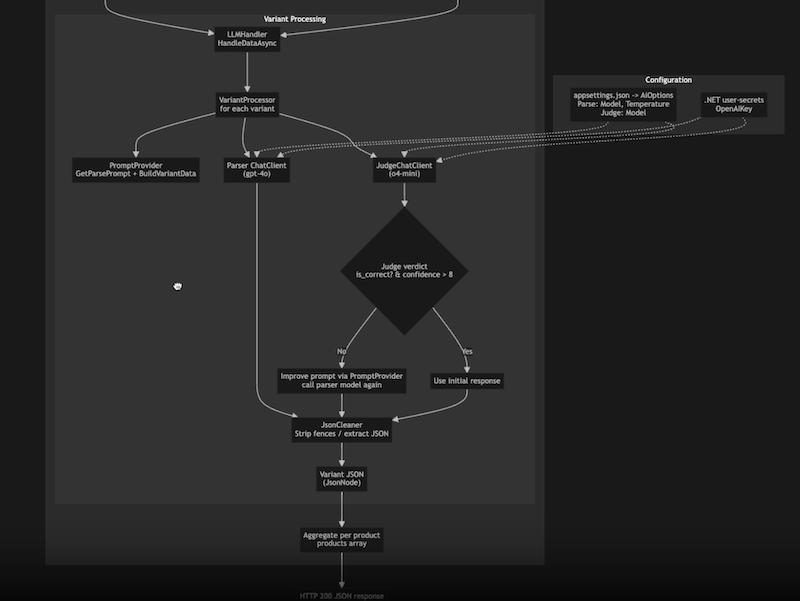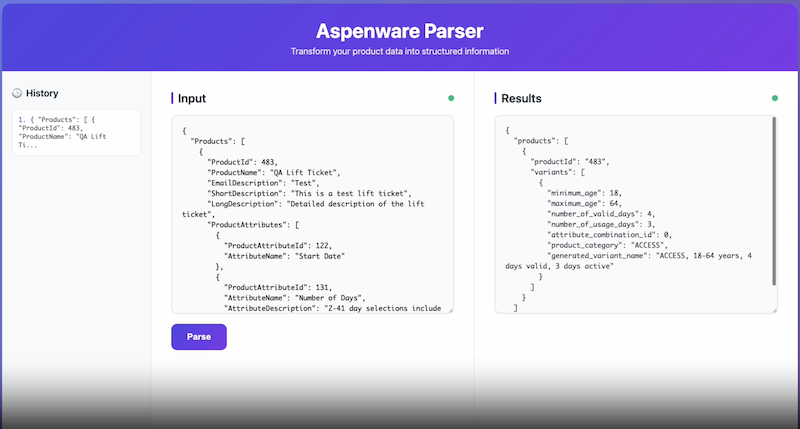AI Unlocks Revenue-Driving Product Catalog Intelligence
Aspenware
Industry
TravelTech / E-Commerce
Service
AI-Powered Data Infrastructure & Product Intelligence
Summary
-
Challenge
A large and growing ecommerce platform for ski resorts is limited in its ability to extract business insights from inconsistently structured product catalogs across its highly-customized storefronts. Limited metadata inhibits the ability to personalize, and raises the cost of developing revenue-driving platform features.
-
Partnership
8th Light developed an AI-driven enrichment pipeline that parses, normalizes, and structures this product data in real time.
-
Impact
We developed an LLM-based proof-of-concept that supports real-time pricing logic, personalization, and performance analytics.

The Opportunity to Unlock Value
Aspenware is a tech platform serving over fifty ski resorts. Across the resort ecommerce ecosystem, product information — especially for dynamically-priced lift tickets — is highly inconsistent. Each storefront encodes ticket metadata differently, which can inhibit pricing engine capabilities, real-time analytics, and downstream automation. But manual cleanup of different ticket data and differing taxonomies is labor-intensive and error-prone.
Seeing an opportunity to unlock new business value with AI, Aspenware engineering and product leadership partnered with 8th Light to build a flexible and accurate data engine. By deploying a custom large language model ("LLM") pipeline, Aspenware is beginning to transform unstructured data into standardized, human-readable product intelligence across all partner resorts.
Looking ahead, a Retrieval-Augmented Generation ("RAG") model could be used to strengthen the pipeline by grounding outputs in resort-specific data and knowledge for greater accuracy.
Our Shared Objective
Build an LLM-powered pipeline to turn variable product metadata into a unified, enriched format, making it easier to understand and laying the groundwork for new pricing optimizations. Reduce admin overhead in managing complex custom product catalogs that differ from resort to resort.

Approach & Results
Using AI to Make Data More Legible
The pipeline is designed to process data within dozens of customized storefronts, focusing initially on lift tickets. The goal? Normalize metadata to a shared schema, extract number of days logic, and enable the calculation of meaningful attributes like per-day price without manual intervention.

The solution includes:
- Metadata transformation using GPT-4o
- Structural validation with a secondary judge LLM (GPT-o3-mini)
- A generalized architecture that accommodates varied product formats and types (e.g., 2-of-3-day passes, holiday pricing, add-ons etc.)
The AI implementation is supported by a set of traditional engineering tools and safeguards that ensure efficiency and reliability such as:
- Pre-processing, where the input data is sanitized and normalized using conventional (non-AI) logic before reaching the LLM. This minimizes token usage and ensures that the AI models will focus only on the relevant parts.
- Fallback logic that verifies that the AI response is valid JSON and matches the expected schema. This includes structured parsing, try/catch fallbacks, and format correction routines.
This normalization allows:
- Faster admin insights on what's being sold
- Standardized pricing breakdowns for frontends without custom logic
- Better customer-facing experiences for return visitors
I appreciate how efficiently 8th Light can dive into a tough problem – even one as specific as ski resort Product Catalog metadata! Their engineering and product knowledge are impressive, and they delivered a functional prototype quickly.
Evan Altman, CTO of Aspenware
From Kickoff to Concept, Together
8th Light delivered a full end-to-end experience, from early requirements gathering to a working proof of concept. The team worked across evolving priorities and branches, integrating contributions from multiple developers while keeping the codebase cohesive through consistent refactoring.
Throughout the engagement, the team used AI-assisted workflows to support ideation, prototyping, and validation. These tools helped accelerate iteration, improve alignment on business outcomes, and shape a solution that reflected Aspenware’s specific needs. The result was a tailored experience that brought new velocity to product exploration.
Delivery included enriched output samples, a functional frontend demo, and inline documentation to support smooth handoff across both engineering and product teams.
Expected results
This project enables the calculation at scale of meaningful optimizations which are known to have positive commercial potential when deployed as merchandising tactics. Per-day pricing is one example of such attributes. Prior A/B tests have revealed that clearly surfacing per-day pricing increases purchasing behavior — especially among return users (25% of traffic but 59% of revenue).
Estimates predict that offering per-day consistently across resorts may yield:
- System-wide: we expect ~+3% uplift in ticket product revenue
- Return users: we expect ~+3–5% uplift (with higher upside possible, up to +10%)
Services Provided
LLM Prompt Engineering & Prototyping
Backend API Design
Product Metadata Normalization
E-Commerce Data Enrichment
Cross-functional Collaboration & Documentation (for Engineers and Product Managers)
Technologies Used
.NET 8
GPT-4o (enrichment)
GPT-o3-mini (judging)
JSON Schema Design
v0.dev
Reaching Peak Potential
This AI-powered proof-of-concept is a foundational step in transforming Aspenware’s ecommerce operations across resort partners. By normalizing product data at ingestion, Aspenware stands to unlock high-value pricing features, reduce ops overhead, and set the stage for next-gen personalization and automation. Future enhancements may include live integration, tools to refine and test enrichment logic, and observability tools to ensure confidence at scale.
Interested in reaching your peak potential?


